Legal Writing & Research: Comparing Civil and Islamic Law Systems
VerifiedAdded on 2022/08/17
|7
|1952
|14
Essay
AI Summary
This essay provides a comparative analysis of civil and Islamic law, highlighting their respective characteristics and applications. It examines the core differences in their guiding principles, with Islamic law rooted in religious doctrines and civil law based on globally accepted moral principles. The essay delves into the similarities between the two legal systems, particularly in areas such as property ownership, wills and testaments, and contract law. It explores the concept of legal ownership, the process of inheritance and will execution under both systems, and the formation and enforcement of contracts. While acknowledging their ideological dissimilarities, the essay emphasizes instances where civil law recognizes customary Islamic law principles, especially in specific dispute resolutions. The study concludes by summarizing the common grounds and dissimilarities, emphasizing the influence of each legal system on the other.
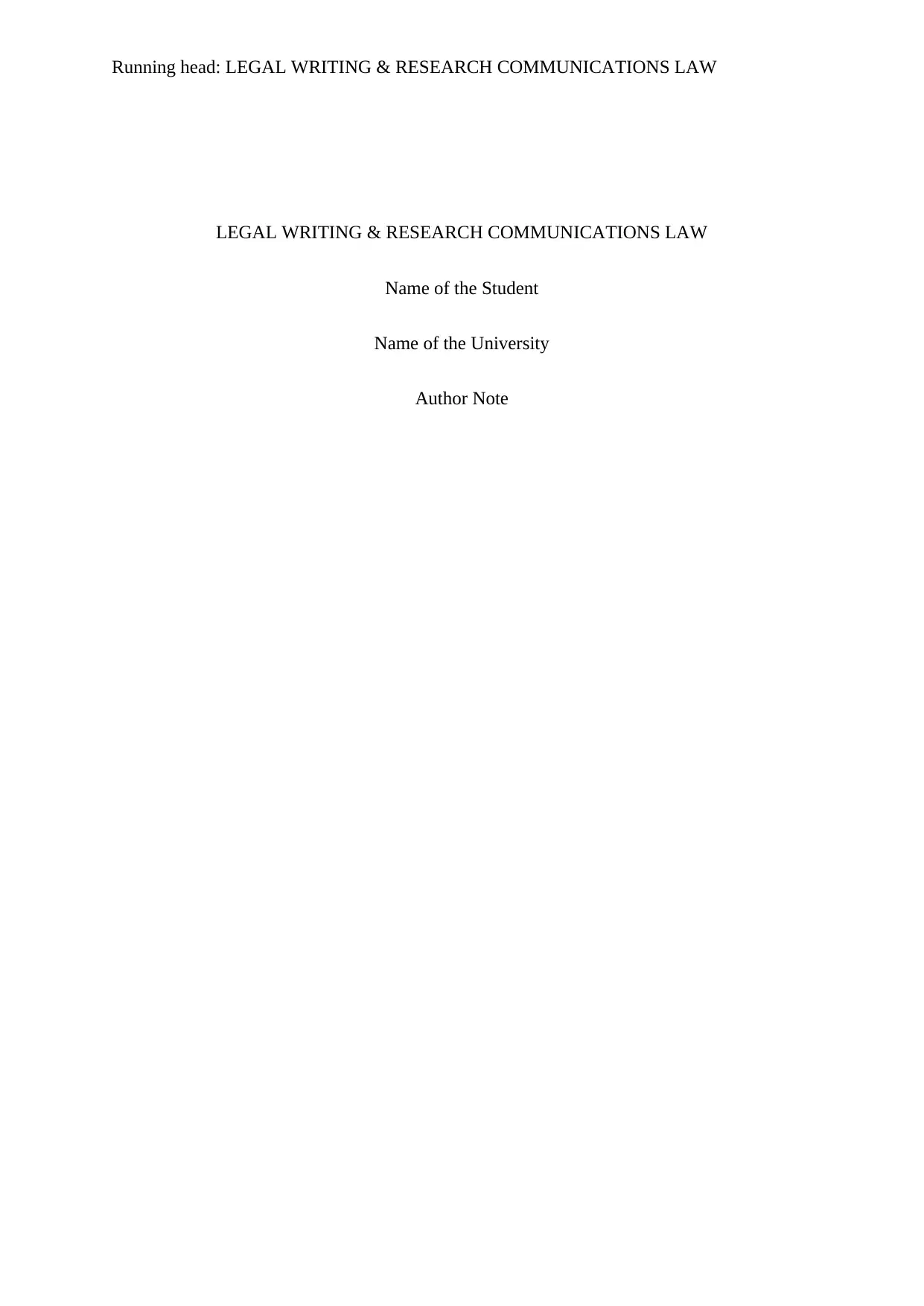
Running head: LEGAL WRITING & RESEARCH COMMUNICATIONS LAW
LEGAL WRITING & RESEARCH COMMUNICATIONS LAW
Name of the Student
Name of the University
Author Note
LEGAL WRITING & RESEARCH COMMUNICATIONS LAW
Name of the Student
Name of the University
Author Note
Paraphrase This Document
Need a fresh take? Get an instant paraphrase of this document with our AI Paraphraser
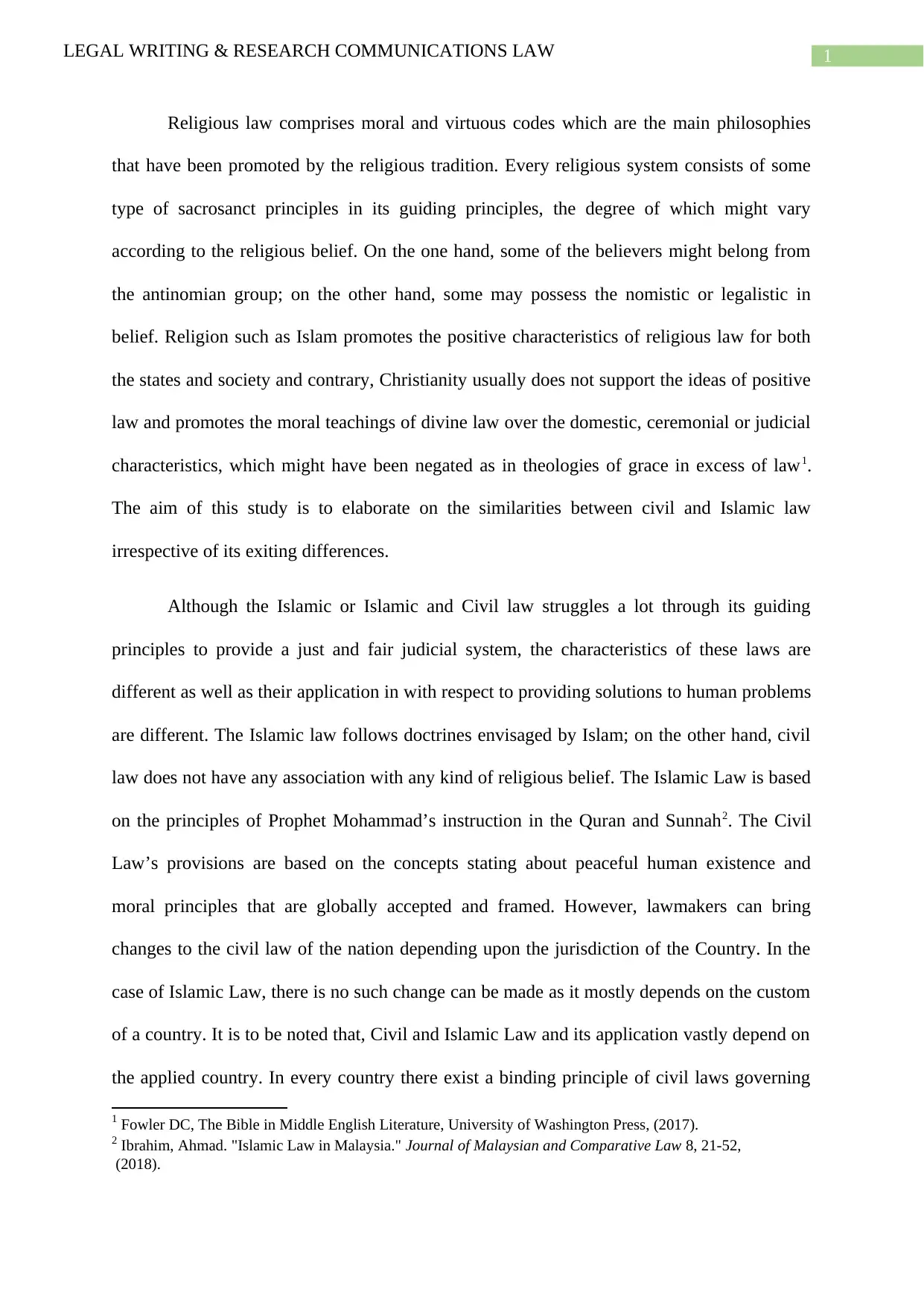
1LEGAL WRITING & RESEARCH COMMUNICATIONS LAW
Religious law comprises moral and virtuous codes which are the main philosophies
that have been promoted by the religious tradition. Every religious system consists of some
type of sacrosanct principles in its guiding principles, the degree of which might vary
according to the religious belief. On the one hand, some of the believers might belong from
the antinomian group; on the other hand, some may possess the nomistic or legalistic in
belief. Religion such as Islam promotes the positive characteristics of religious law for both
the states and society and contrary, Christianity usually does not support the ideas of positive
law and promotes the moral teachings of divine law over the domestic, ceremonial or judicial
characteristics, which might have been negated as in theologies of grace in excess of law1.
The aim of this study is to elaborate on the similarities between civil and Islamic law
irrespective of its exiting differences.
Although the Islamic or Islamic and Civil law struggles a lot through its guiding
principles to provide a just and fair judicial system, the characteristics of these laws are
different as well as their application in with respect to providing solutions to human problems
are different. The Islamic law follows doctrines envisaged by Islam; on the other hand, civil
law does not have any association with any kind of religious belief. The Islamic Law is based
on the principles of Prophet Mohammad’s instruction in the Quran and Sunnah2. The Civil
Law’s provisions are based on the concepts stating about peaceful human existence and
moral principles that are globally accepted and framed. However, lawmakers can bring
changes to the civil law of the nation depending upon the jurisdiction of the Country. In the
case of Islamic Law, there is no such change can be made as it mostly depends on the custom
of a country. It is to be noted that, Civil and Islamic Law and its application vastly depend on
the applied country. In every country there exist a binding principle of civil laws governing
1 Fowler DC, The Bible in Middle English Literature, University of Washington Press, (2017).
2 Ibrahim, Ahmad. "Islamic Law in Malaysia." Journal of Malaysian and Comparative Law 8, 21-52,
(2018).
Religious law comprises moral and virtuous codes which are the main philosophies
that have been promoted by the religious tradition. Every religious system consists of some
type of sacrosanct principles in its guiding principles, the degree of which might vary
according to the religious belief. On the one hand, some of the believers might belong from
the antinomian group; on the other hand, some may possess the nomistic or legalistic in
belief. Religion such as Islam promotes the positive characteristics of religious law for both
the states and society and contrary, Christianity usually does not support the ideas of positive
law and promotes the moral teachings of divine law over the domestic, ceremonial or judicial
characteristics, which might have been negated as in theologies of grace in excess of law1.
The aim of this study is to elaborate on the similarities between civil and Islamic law
irrespective of its exiting differences.
Although the Islamic or Islamic and Civil law struggles a lot through its guiding
principles to provide a just and fair judicial system, the characteristics of these laws are
different as well as their application in with respect to providing solutions to human problems
are different. The Islamic law follows doctrines envisaged by Islam; on the other hand, civil
law does not have any association with any kind of religious belief. The Islamic Law is based
on the principles of Prophet Mohammad’s instruction in the Quran and Sunnah2. The Civil
Law’s provisions are based on the concepts stating about peaceful human existence and
moral principles that are globally accepted and framed. However, lawmakers can bring
changes to the civil law of the nation depending upon the jurisdiction of the Country. In the
case of Islamic Law, there is no such change can be made as it mostly depends on the custom
of a country. It is to be noted that, Civil and Islamic Law and its application vastly depend on
the applied country. In every country there exist a binding principle of civil laws governing
1 Fowler DC, The Bible in Middle English Literature, University of Washington Press, (2017).
2 Ibrahim, Ahmad. "Islamic Law in Malaysia." Journal of Malaysian and Comparative Law 8, 21-52,
(2018).
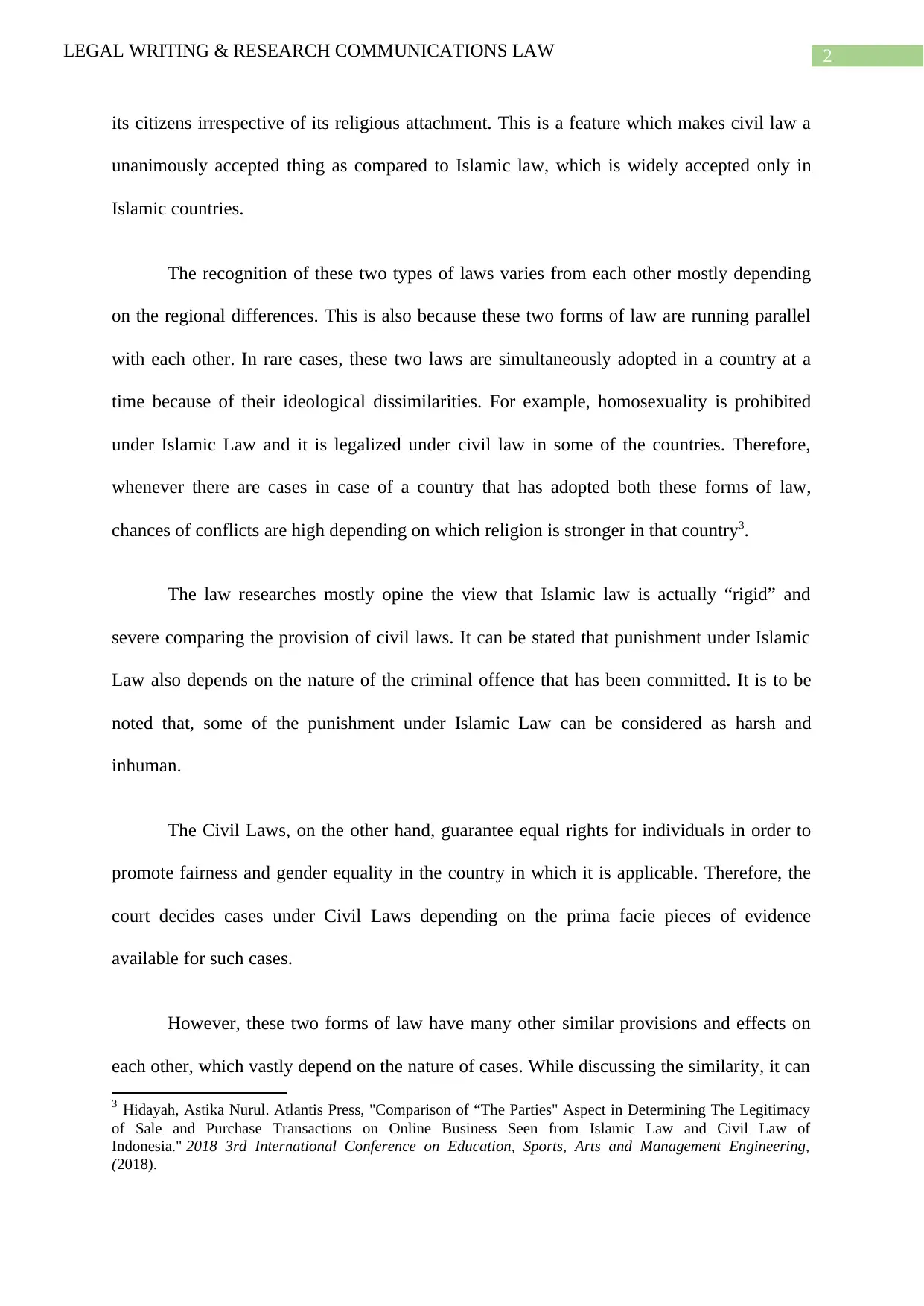
2LEGAL WRITING & RESEARCH COMMUNICATIONS LAW
its citizens irrespective of its religious attachment. This is a feature which makes civil law a
unanimously accepted thing as compared to Islamic law, which is widely accepted only in
Islamic countries.
The recognition of these two types of laws varies from each other mostly depending
on the regional differences. This is also because these two forms of law are running parallel
with each other. In rare cases, these two laws are simultaneously adopted in a country at a
time because of their ideological dissimilarities. For example, homosexuality is prohibited
under Islamic Law and it is legalized under civil law in some of the countries. Therefore,
whenever there are cases in case of a country that has adopted both these forms of law,
chances of conflicts are high depending on which religion is stronger in that country3.
The law researches mostly opine the view that Islamic law is actually “rigid” and
severe comparing the provision of civil laws. It can be stated that punishment under Islamic
Law also depends on the nature of the criminal offence that has been committed. It is to be
noted that, some of the punishment under Islamic Law can be considered as harsh and
inhuman.
The Civil Laws, on the other hand, guarantee equal rights for individuals in order to
promote fairness and gender equality in the country in which it is applicable. Therefore, the
court decides cases under Civil Laws depending on the prima facie pieces of evidence
available for such cases.
However, these two forms of law have many other similar provisions and effects on
each other, which vastly depend on the nature of cases. While discussing the similarity, it can
3 Hidayah, Astika Nurul. Atlantis Press, "Comparison of “The Parties" Aspect in Determining The Legitimacy
of Sale and Purchase Transactions on Online Business Seen from Islamic Law and Civil Law of
Indonesia." 2018 3rd International Conference on Education, Sports, Arts and Management Engineering,
(2018).
its citizens irrespective of its religious attachment. This is a feature which makes civil law a
unanimously accepted thing as compared to Islamic law, which is widely accepted only in
Islamic countries.
The recognition of these two types of laws varies from each other mostly depending
on the regional differences. This is also because these two forms of law are running parallel
with each other. In rare cases, these two laws are simultaneously adopted in a country at a
time because of their ideological dissimilarities. For example, homosexuality is prohibited
under Islamic Law and it is legalized under civil law in some of the countries. Therefore,
whenever there are cases in case of a country that has adopted both these forms of law,
chances of conflicts are high depending on which religion is stronger in that country3.
The law researches mostly opine the view that Islamic law is actually “rigid” and
severe comparing the provision of civil laws. It can be stated that punishment under Islamic
Law also depends on the nature of the criminal offence that has been committed. It is to be
noted that, some of the punishment under Islamic Law can be considered as harsh and
inhuman.
The Civil Laws, on the other hand, guarantee equal rights for individuals in order to
promote fairness and gender equality in the country in which it is applicable. Therefore, the
court decides cases under Civil Laws depending on the prima facie pieces of evidence
available for such cases.
However, these two forms of law have many other similar provisions and effects on
each other, which vastly depend on the nature of cases. While discussing the similarity, it can
3 Hidayah, Astika Nurul. Atlantis Press, "Comparison of “The Parties" Aspect in Determining The Legitimacy
of Sale and Purchase Transactions on Online Business Seen from Islamic Law and Civil Law of
Indonesia." 2018 3rd International Conference on Education, Sports, Arts and Management Engineering,
(2018).
⊘ This is a preview!⊘
Do you want full access?
Subscribe today to unlock all pages.

Trusted by 1+ million students worldwide
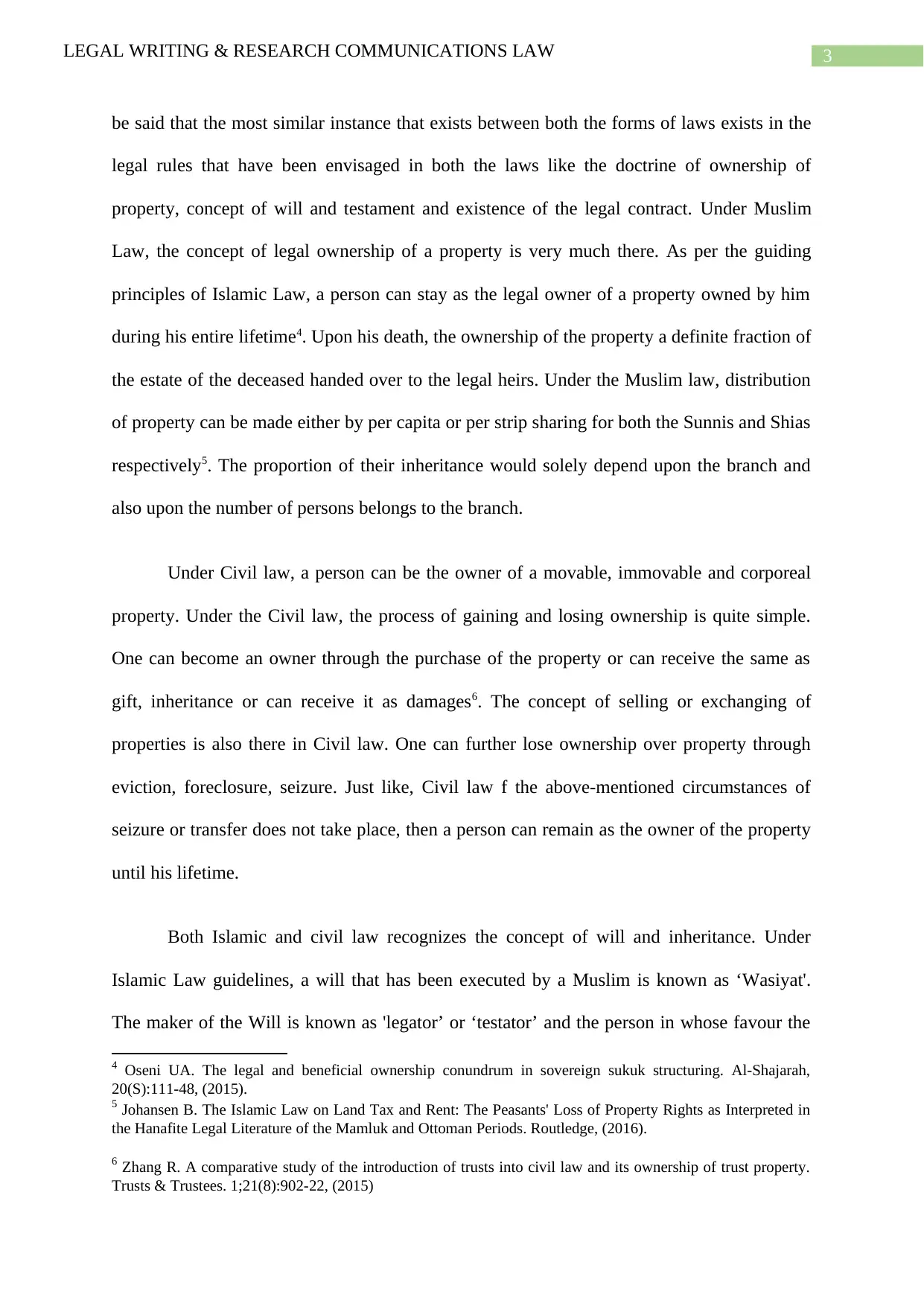
3LEGAL WRITING & RESEARCH COMMUNICATIONS LAW
be said that the most similar instance that exists between both the forms of laws exists in the
legal rules that have been envisaged in both the laws like the doctrine of ownership of
property, concept of will and testament and existence of the legal contract. Under Muslim
Law, the concept of legal ownership of a property is very much there. As per the guiding
principles of Islamic Law, a person can stay as the legal owner of a property owned by him
during his entire lifetime4. Upon his death, the ownership of the property a definite fraction of
the estate of the deceased handed over to the legal heirs. Under the Muslim law, distribution
of property can be made either by per capita or per strip sharing for both the Sunnis and Shias
respectively5. The proportion of their inheritance would solely depend upon the branch and
also upon the number of persons belongs to the branch.
Under Civil law, a person can be the owner of a movable, immovable and corporeal
property. Under the Civil law, the process of gaining and losing ownership is quite simple.
One can become an owner through the purchase of the property or can receive the same as
gift, inheritance or can receive it as damages6. The concept of selling or exchanging of
properties is also there in Civil law. One can further lose ownership over property through
eviction, foreclosure, seizure. Just like, Civil law f the above-mentioned circumstances of
seizure or transfer does not take place, then a person can remain as the owner of the property
until his lifetime.
Both Islamic and civil law recognizes the concept of will and inheritance. Under
Islamic Law guidelines, a will that has been executed by a Muslim is known as ‘Wasiyat'.
The maker of the Will is known as 'legator’ or ‘testator’ and the person in whose favour the
4 Oseni UA. The legal and beneficial ownership conundrum in sovereign sukuk structuring. Al-Shajarah,
20(S):111-48, (2015).
5 Johansen B. The Islamic Law on Land Tax and Rent: The Peasants' Loss of Property Rights as Interpreted in
the Hanafite Legal Literature of the Mamluk and Ottoman Periods. Routledge, (2016).
6 Zhang R. A comparative study of the introduction of trusts into civil law and its ownership of trust property.
Trusts & Trustees. 1;21(8):902-22, (2015)
be said that the most similar instance that exists between both the forms of laws exists in the
legal rules that have been envisaged in both the laws like the doctrine of ownership of
property, concept of will and testament and existence of the legal contract. Under Muslim
Law, the concept of legal ownership of a property is very much there. As per the guiding
principles of Islamic Law, a person can stay as the legal owner of a property owned by him
during his entire lifetime4. Upon his death, the ownership of the property a definite fraction of
the estate of the deceased handed over to the legal heirs. Under the Muslim law, distribution
of property can be made either by per capita or per strip sharing for both the Sunnis and Shias
respectively5. The proportion of their inheritance would solely depend upon the branch and
also upon the number of persons belongs to the branch.
Under Civil law, a person can be the owner of a movable, immovable and corporeal
property. Under the Civil law, the process of gaining and losing ownership is quite simple.
One can become an owner through the purchase of the property or can receive the same as
gift, inheritance or can receive it as damages6. The concept of selling or exchanging of
properties is also there in Civil law. One can further lose ownership over property through
eviction, foreclosure, seizure. Just like, Civil law f the above-mentioned circumstances of
seizure or transfer does not take place, then a person can remain as the owner of the property
until his lifetime.
Both Islamic and civil law recognizes the concept of will and inheritance. Under
Islamic Law guidelines, a will that has been executed by a Muslim is known as ‘Wasiyat'.
The maker of the Will is known as 'legator’ or ‘testator’ and the person in whose favour the
4 Oseni UA. The legal and beneficial ownership conundrum in sovereign sukuk structuring. Al-Shajarah,
20(S):111-48, (2015).
5 Johansen B. The Islamic Law on Land Tax and Rent: The Peasants' Loss of Property Rights as Interpreted in
the Hanafite Legal Literature of the Mamluk and Ottoman Periods. Routledge, (2016).
6 Zhang R. A comparative study of the introduction of trusts into civil law and its ownership of trust property.
Trusts & Trustees. 1;21(8):902-22, (2015)
Paraphrase This Document
Need a fresh take? Get an instant paraphrase of this document with our AI Paraphraser
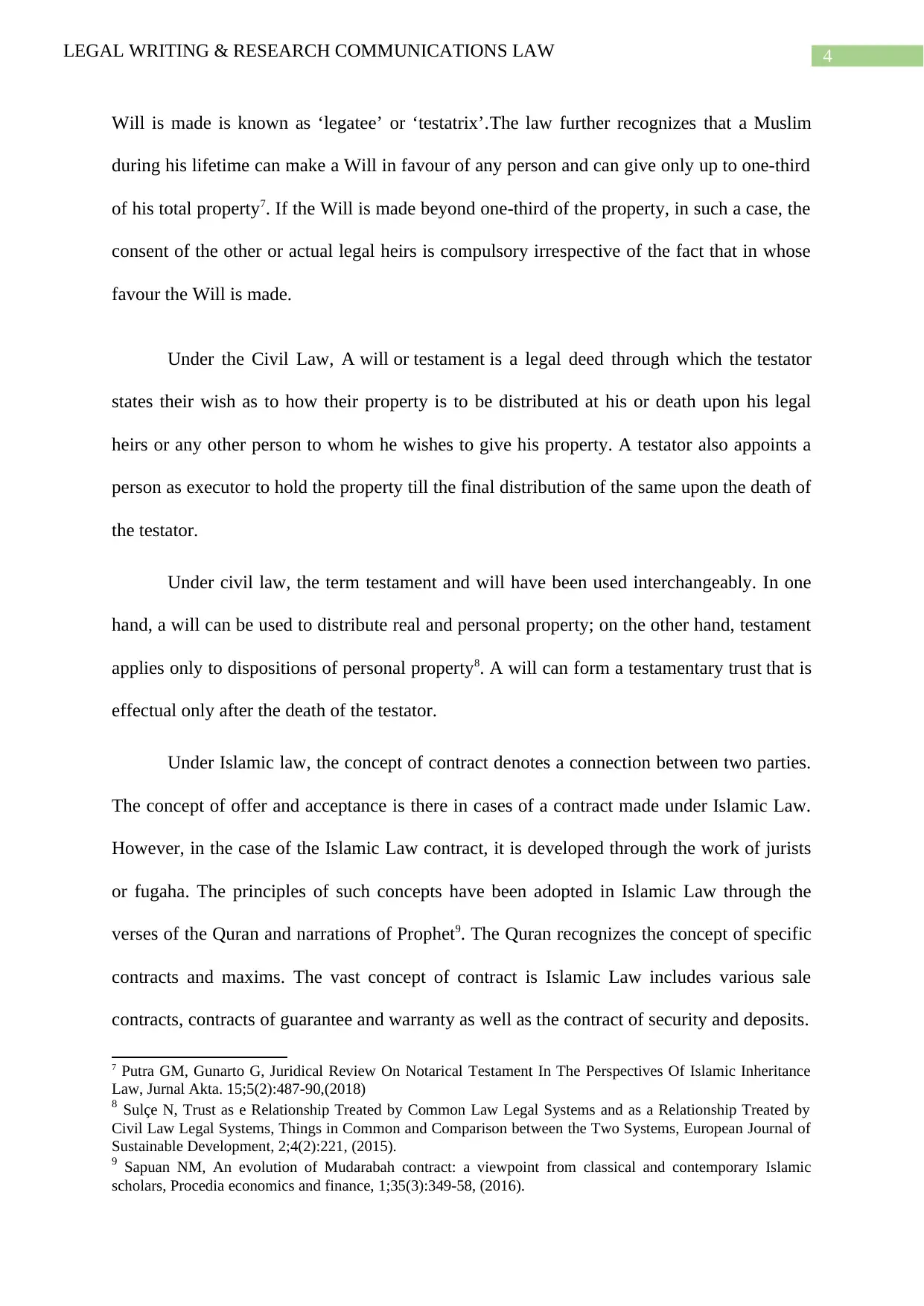
4LEGAL WRITING & RESEARCH COMMUNICATIONS LAW
Will is made is known as ‘legatee’ or ‘testatrix’.The law further recognizes that a Muslim
during his lifetime can make a Will in favour of any person and can give only up to one-third
of his total property7. If the Will is made beyond one-third of the property, in such a case, the
consent of the other or actual legal heirs is compulsory irrespective of the fact that in whose
favour the Will is made.
Under the Civil Law, A will or testament is a legal deed through which the testator
states their wish as to how their property is to be distributed at his or death upon his legal
heirs or any other person to whom he wishes to give his property. A testator also appoints a
person as executor to hold the property till the final distribution of the same upon the death of
the testator.
Under civil law, the term testament and will have been used interchangeably. In one
hand, a will can be used to distribute real and personal property; on the other hand, testament
applies only to dispositions of personal property8. A will can form a testamentary trust that is
effectual only after the death of the testator.
Under Islamic law, the concept of contract denotes a connection between two parties.
The concept of offer and acceptance is there in cases of a contract made under Islamic Law.
However, in the case of the Islamic Law contract, it is developed through the work of jurists
or fugaha. The principles of such concepts have been adopted in Islamic Law through the
verses of the Quran and narrations of Prophet9. The Quran recognizes the concept of specific
contracts and maxims. The vast concept of contract is Islamic Law includes various sale
contracts, contracts of guarantee and warranty as well as the contract of security and deposits.
7 Putra GM, Gunarto G, Juridical Review On Notarical Testament In The Perspectives Of Islamic Inheritance
Law, Jurnal Akta. 15;5(2):487-90,(2018)
8 Sulçe N, Trust as e Relationship Treated by Common Law Legal Systems and as a Relationship Treated by
Civil Law Legal Systems, Things in Common and Comparison between the Two Systems, European Journal of
Sustainable Development, 2;4(2):221, (2015).
9 Sapuan NM, An evolution of Mudarabah contract: a viewpoint from classical and contemporary Islamic
scholars, Procedia economics and finance, 1;35(3):349-58, (2016).
Will is made is known as ‘legatee’ or ‘testatrix’.The law further recognizes that a Muslim
during his lifetime can make a Will in favour of any person and can give only up to one-third
of his total property7. If the Will is made beyond one-third of the property, in such a case, the
consent of the other or actual legal heirs is compulsory irrespective of the fact that in whose
favour the Will is made.
Under the Civil Law, A will or testament is a legal deed through which the testator
states their wish as to how their property is to be distributed at his or death upon his legal
heirs or any other person to whom he wishes to give his property. A testator also appoints a
person as executor to hold the property till the final distribution of the same upon the death of
the testator.
Under civil law, the term testament and will have been used interchangeably. In one
hand, a will can be used to distribute real and personal property; on the other hand, testament
applies only to dispositions of personal property8. A will can form a testamentary trust that is
effectual only after the death of the testator.
Under Islamic law, the concept of contract denotes a connection between two parties.
The concept of offer and acceptance is there in cases of a contract made under Islamic Law.
However, in the case of the Islamic Law contract, it is developed through the work of jurists
or fugaha. The principles of such concepts have been adopted in Islamic Law through the
verses of the Quran and narrations of Prophet9. The Quran recognizes the concept of specific
contracts and maxims. The vast concept of contract is Islamic Law includes various sale
contracts, contracts of guarantee and warranty as well as the contract of security and deposits.
7 Putra GM, Gunarto G, Juridical Review On Notarical Testament In The Perspectives Of Islamic Inheritance
Law, Jurnal Akta. 15;5(2):487-90,(2018)
8 Sulçe N, Trust as e Relationship Treated by Common Law Legal Systems and as a Relationship Treated by
Civil Law Legal Systems, Things in Common and Comparison between the Two Systems, European Journal of
Sustainable Development, 2;4(2):221, (2015).
9 Sapuan NM, An evolution of Mudarabah contract: a viewpoint from classical and contemporary Islamic
scholars, Procedia economics and finance, 1;35(3):349-58, (2016).
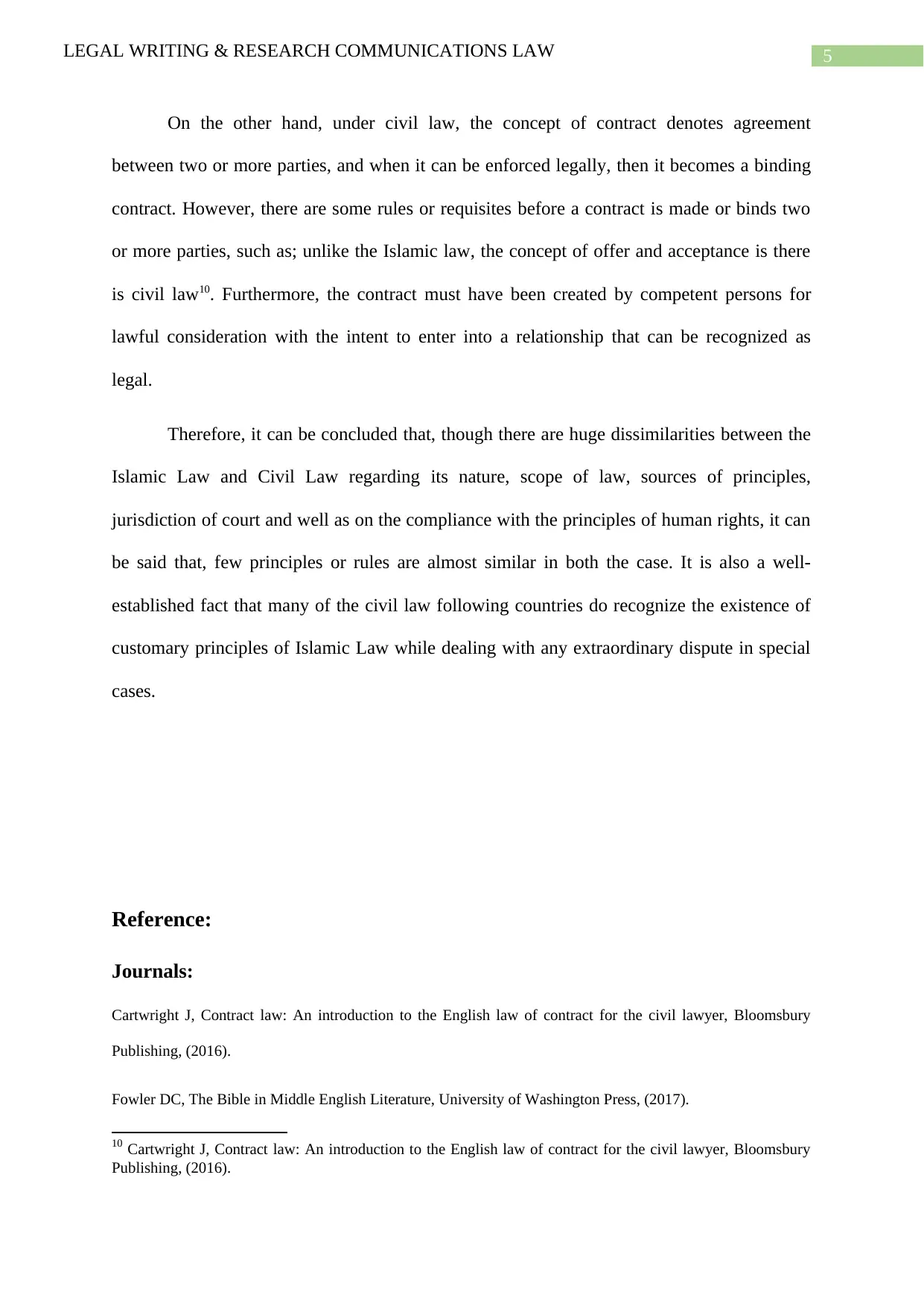
5LEGAL WRITING & RESEARCH COMMUNICATIONS LAW
On the other hand, under civil law, the concept of contract denotes agreement
between two or more parties, and when it can be enforced legally, then it becomes a binding
contract. However, there are some rules or requisites before a contract is made or binds two
or more parties, such as; unlike the Islamic law, the concept of offer and acceptance is there
is civil law10. Furthermore, the contract must have been created by competent persons for
lawful consideration with the intent to enter into a relationship that can be recognized as
legal.
Therefore, it can be concluded that, though there are huge dissimilarities between the
Islamic Law and Civil Law regarding its nature, scope of law, sources of principles,
jurisdiction of court and well as on the compliance with the principles of human rights, it can
be said that, few principles or rules are almost similar in both the case. It is also a well-
established fact that many of the civil law following countries do recognize the existence of
customary principles of Islamic Law while dealing with any extraordinary dispute in special
cases.
Reference:
Journals:
Cartwright J, Contract law: An introduction to the English law of contract for the civil lawyer, Bloomsbury
Publishing, (2016).
Fowler DC, The Bible in Middle English Literature, University of Washington Press, (2017).
10 Cartwright J, Contract law: An introduction to the English law of contract for the civil lawyer, Bloomsbury
Publishing, (2016).
On the other hand, under civil law, the concept of contract denotes agreement
between two or more parties, and when it can be enforced legally, then it becomes a binding
contract. However, there are some rules or requisites before a contract is made or binds two
or more parties, such as; unlike the Islamic law, the concept of offer and acceptance is there
is civil law10. Furthermore, the contract must have been created by competent persons for
lawful consideration with the intent to enter into a relationship that can be recognized as
legal.
Therefore, it can be concluded that, though there are huge dissimilarities between the
Islamic Law and Civil Law regarding its nature, scope of law, sources of principles,
jurisdiction of court and well as on the compliance with the principles of human rights, it can
be said that, few principles or rules are almost similar in both the case. It is also a well-
established fact that many of the civil law following countries do recognize the existence of
customary principles of Islamic Law while dealing with any extraordinary dispute in special
cases.
Reference:
Journals:
Cartwright J, Contract law: An introduction to the English law of contract for the civil lawyer, Bloomsbury
Publishing, (2016).
Fowler DC, The Bible in Middle English Literature, University of Washington Press, (2017).
10 Cartwright J, Contract law: An introduction to the English law of contract for the civil lawyer, Bloomsbury
Publishing, (2016).
⊘ This is a preview!⊘
Do you want full access?
Subscribe today to unlock all pages.

Trusted by 1+ million students worldwide
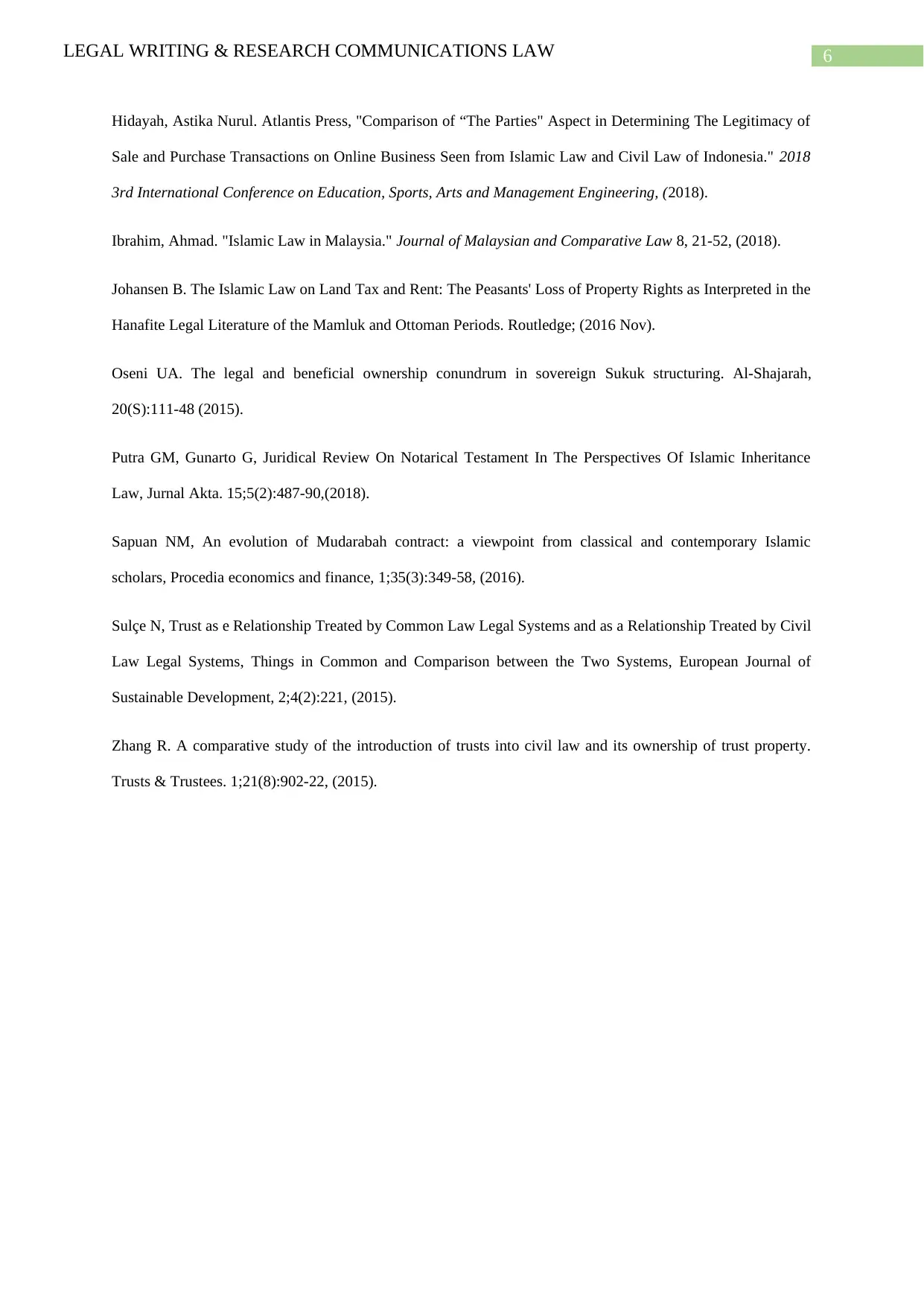
6LEGAL WRITING & RESEARCH COMMUNICATIONS LAW
Hidayah, Astika Nurul. Atlantis Press, "Comparison of “The Parties" Aspect in Determining The Legitimacy of
Sale and Purchase Transactions on Online Business Seen from Islamic Law and Civil Law of Indonesia." 2018
3rd International Conference on Education, Sports, Arts and Management Engineering, (2018).
Ibrahim, Ahmad. "Islamic Law in Malaysia." Journal of Malaysian and Comparative Law 8, 21-52, (2018).
Johansen B. The Islamic Law on Land Tax and Rent: The Peasants' Loss of Property Rights as Interpreted in the
Hanafite Legal Literature of the Mamluk and Ottoman Periods. Routledge; (2016 Nov).
Oseni UA. The legal and beneficial ownership conundrum in sovereign Sukuk structuring. Al-Shajarah,
20(S):111-48 (2015).
Putra GM, Gunarto G, Juridical Review On Notarical Testament In The Perspectives Of Islamic Inheritance
Law, Jurnal Akta. 15;5(2):487-90,(2018).
Sapuan NM, An evolution of Mudarabah contract: a viewpoint from classical and contemporary Islamic
scholars, Procedia economics and finance, 1;35(3):349-58, (2016).
Sulçe N, Trust as e Relationship Treated by Common Law Legal Systems and as a Relationship Treated by Civil
Law Legal Systems, Things in Common and Comparison between the Two Systems, European Journal of
Sustainable Development, 2;4(2):221, (2015).
Zhang R. A comparative study of the introduction of trusts into civil law and its ownership of trust property.
Trusts & Trustees. 1;21(8):902-22, (2015).
Hidayah, Astika Nurul. Atlantis Press, "Comparison of “The Parties" Aspect in Determining The Legitimacy of
Sale and Purchase Transactions on Online Business Seen from Islamic Law and Civil Law of Indonesia." 2018
3rd International Conference on Education, Sports, Arts and Management Engineering, (2018).
Ibrahim, Ahmad. "Islamic Law in Malaysia." Journal of Malaysian and Comparative Law 8, 21-52, (2018).
Johansen B. The Islamic Law on Land Tax and Rent: The Peasants' Loss of Property Rights as Interpreted in the
Hanafite Legal Literature of the Mamluk and Ottoman Periods. Routledge; (2016 Nov).
Oseni UA. The legal and beneficial ownership conundrum in sovereign Sukuk structuring. Al-Shajarah,
20(S):111-48 (2015).
Putra GM, Gunarto G, Juridical Review On Notarical Testament In The Perspectives Of Islamic Inheritance
Law, Jurnal Akta. 15;5(2):487-90,(2018).
Sapuan NM, An evolution of Mudarabah contract: a viewpoint from classical and contemporary Islamic
scholars, Procedia economics and finance, 1;35(3):349-58, (2016).
Sulçe N, Trust as e Relationship Treated by Common Law Legal Systems and as a Relationship Treated by Civil
Law Legal Systems, Things in Common and Comparison between the Two Systems, European Journal of
Sustainable Development, 2;4(2):221, (2015).
Zhang R. A comparative study of the introduction of trusts into civil law and its ownership of trust property.
Trusts & Trustees. 1;21(8):902-22, (2015).
1 out of 7
Related Documents
Your All-in-One AI-Powered Toolkit for Academic Success.
+13062052269
info@desklib.com
Available 24*7 on WhatsApp / Email
![[object Object]](/_next/static/media/star-bottom.7253800d.svg)
Unlock your academic potential
Copyright © 2020–2026 A2Z Services. All Rights Reserved. Developed and managed by ZUCOL.





